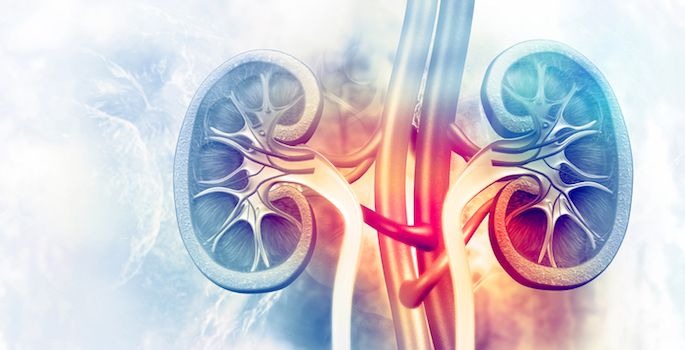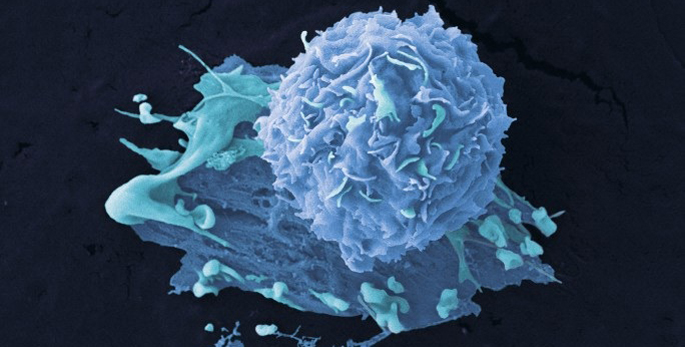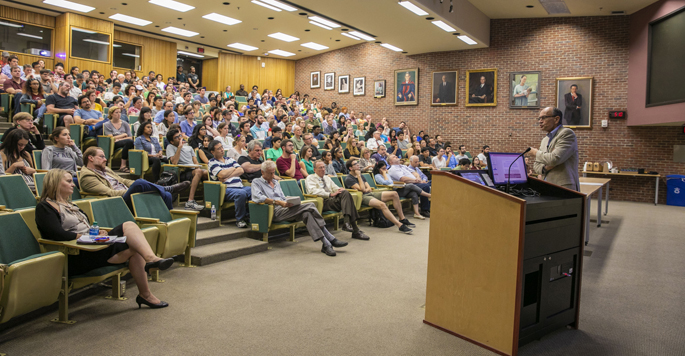Research
-

How to fake a medical record
Simulated electronic health records could avoid patient privacy risks and help speed discovery. Read MoreNov 4, 2019
-

Acute kidney injury recovery time impacts future risk
Interventions that impact the timing of recovery following acute injury may improve future outcomes for patients. Read MoreOct 31, 2019
-

Imaging host-pathogen battle for metal
An unprecedented view of bacterial products within infected tissues opens new opportunities to explore infection biology and devise novel therapeutic strategies. Read MoreOct 31, 2019
-

Vanderbilt team wins $1M in DARPA spectrum challenge finale
In a final five-minute flurry, MarmotE watched its lead slip. At the buzzer, the team placed second and won $1 million in the DARPA Spectrum Collaboration Challenge. The team of four researchers, now very close friends, have worked together since 2016 to create an AI-radio system that can manage the wireless spectrum, finding unused slices... Read MoreOct 29, 2019
-

Biophotonics device for parathyroid I.D. is a R&D 100 Awards finalist
An optical imaging technology developed by Orrin H. Ingram Professor of Biomedical Engineering Anita Mahadevan-Jansen and her group, in partnership with a medical device company, has been selected as a finalist for the 2019 R&D 100 Awards. Read MoreOct 28, 2019
-

High fiber, yogurt diet associated with lower lung cancer risk
A diet high in fiber and yogurt is associated with a reduced risk for lung cancer, according to a study by Vanderbilt University Medical Center researchers. Read MoreOct 28, 2019
-

Team set to study undiagnosed congenital diarrhea in infants
Researchers at four institutions, including Vanderbilt, have been awarded a five-year, $9.4 million federal grant to tackle undiagnosed congenital diarrheas caused by a single gene mutation. Read MoreOct 24, 2019
-

Alert system for failing nuclear plant pipes uses thin films and sound vibrations
A failing pipe can be tough to spot. It may cause a puddle, produce another sign of damage, or simply burst before detection. A flooded kitchen or laundry room is messy and inconvenient, but the stakes are much, much higher in nuclear power plants – which on average contain many miles of pipeline. As concern... Read MoreOct 24, 2019
-

Another way to detect lymphedema
Early detection of lymphedema, which occurs in 20% of patients following breast cancer treatment, may improve therapeutic options for patients. Read MoreOct 22, 2019
-

Completing DNA synthesis
James Dewar and colleagues have identified a role for the enzyme topoisomerase II in reducing replication errors during the final stage of DNA synthesis. Read MoreOct 21, 2019
-

Microscopic spines connect worm neurons
Worm neurons have microscopic “spines” — where nerve-to-nerve communication happens — that share features with mammalian neurons, supporting the use of worms to study spine genetics and biology. Read MoreOct 17, 2019
-

Less inflammation = better healing
Immune cells that produce an anti-inflammatory factor are enriched in fat tissue around the heart and may be good targets to improve heart attack outcomes. Read MoreOct 17, 2019
-

Study finds men have higher mortality rate after breast cancer diagnosis
A new study shows men with breast cancer are more likely to die than their female counterparts, across all stages of disease. Read MoreOct 17, 2019
-

Smart City project gives Nashville data-based planning tools
Vanderbilt researchers have discovered a vortex—and this one has nothing to do with icy, polar weather. Working with the Nashville Fire Department and Davidson County Information Technology Services, a team of Vanderbilt computer scientists and engineers analyzed more than three years of NFD incident data. The team looked at location, time and type of incidents... Read MoreOct 17, 2019
-

$2.3 million NIH grant allows collaborators focus on advancing liver cancer surgical care
A multi-year collective effort between engineers, surgeons and scientists has resulted in a $2.3 million, four-year grant awarded by the National Institute of Biomedical Imaging and Bioengineering of the National Institutes of Health to improve laparoscopic liver surgery and liver cancer ablation therapy. Read MoreOct 10, 2019
-

Nobel laureate Südhof reviews his landmark signaling research
The human brain consists of perhaps as many as 1,000 trillion synapses, which transmit signals from one nerve cell to another with amazing speed, precision and plasticity. Read MoreOct 10, 2019
-

A new regulator of B cell development
New findings establish a role for the pro-inflammatory molecule IL-33 in the early development of antibody-producing B cells. Read MoreOct 8, 2019
-

AI maps routes to heart disease
Machine learning on unlabeled electronic health record data has shed light on the emergence of cardiovascular disease. Read MoreOct 7, 2019
-

Study: personalized decision support affects intensive care
For patients in pediatric intensive care who are at high risk for acute kidney injury (AKI), giving clinicians automated decision support during the electronic order entry process increased the rate of blood testing for AKI by 9%. Read MoreOct 3, 2019
-

A step toward gastric cancer
New research findings provide insight into the detrimental events that develop in response to H. pylori infection. Read MoreOct 3, 2019